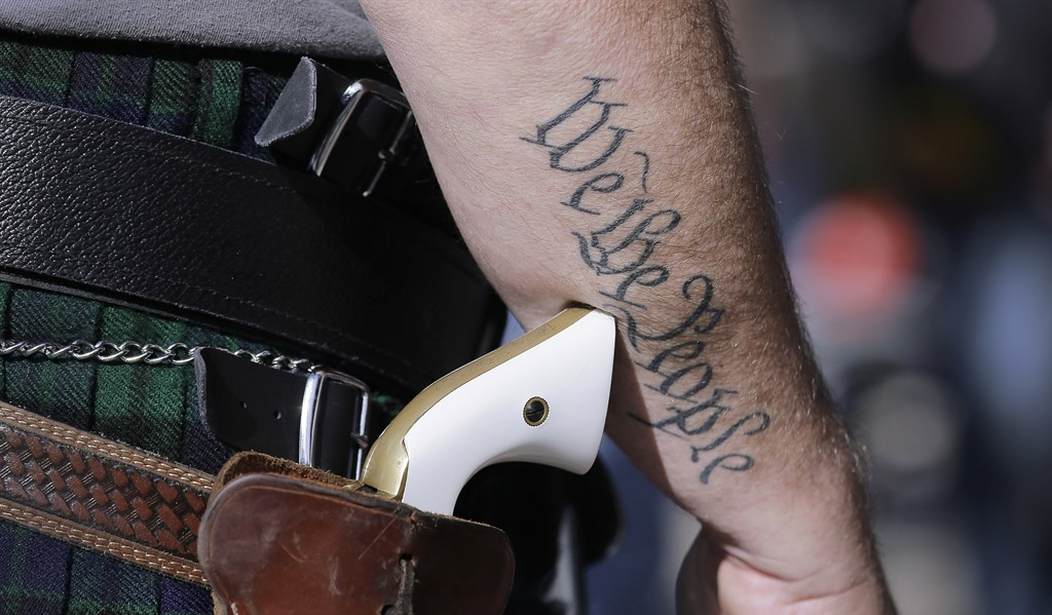I’m starting to get the feeling that the Left doesn’t think too highly of New York City residents. New York Solicitor General Barbara Underwood argued to the Supreme Court that it’s just too dangerous to “let” the average citizen carry a firearm in self-defense on city streets, despite the fact that “shall issue” right to carry is the law of the land in 42 states around the country. Now former federal prosecutor Jim Zirin is adding his voice to the chorus of complainers who insist that if SCOTUS strikes down the state’s subjective “may issue” carry permitting scheme, the “Wild West” is soon to follow.
It appears that the Wild West will soon return to America. At least, that’s what the Supreme Court indicated at oral argument recently.
… Under the New York regime, a citizen must show “proper cause.” to get a license. “Proper cause” requires a showing of a special need to defend oneself rather than a speculative wish to protect person or property. What is proper cause is left to the discretion of the authorities.
Actually, if you are an originalist, and believe that the Constitution should be interpreted in accordance with the original understanding of the society in 1791 when the Second Amendment was enacted, you might want to know that we have had more than 700 years of legal history supporting the proposition that, as one conservative judge recently put it, “Government has the power to regulate arms in the public square.”
Not all conservatives agree with the challenge to New York’s law. Former federal appeals court judge J. Michael Luttig argued in an amicus brief to the Supreme Court that “the original understanding of the Second Amendment was that there is not an absolute, unfettered right to carry loaded guns in public.”
Judge Luttig also authored a guest essay in The New York Times explaining that “at stake… is whether the Supreme Court will claim for itself the power to decide where and when Americans can carry loaded firearms in public-a power that the Constitution reserves for the people and their elected representatives.”
Fordham Professor Saul Cornell, one of the leading authorities on early American constitutional thought, led 16 professors of history and law in a brief, arguing that “One of the longest continuous traditions in Anglo-American law are limits on the public carry of arms in populous areas.”
At the recent oral argument, though, conservatives on the Court seemed to ignore the original understanding and history of public carry laws, and challenged the lawyers for New York state who defended the Sullivan law.
With all due respect to Zirin, there’s a fundamental flaw in his argument. Actually, there are several. First, this case isn’t about an “absolute, unfettered right to carry loaded guns in public.” The case isn’t challenging any time, manner, and place restrictions that are already placed on those who possess an unrestricted carry license. Instead, the case is about whether or not the Second Amendment rights of the average New Yorker are being violated by having to demonstrate some special need or purpose before they can exercise their right to bear arms.
There will almost certainly continue to be limits placed on where lawful gun owners can carry after the Supreme Court issues its decision in the Bruen case, and those limits can and will be challenged in future court cases. But the Bruen case is about who can carry, not where they can carry, and Zirin avoids that argument completely.
My father and mother, lifelong New Yorkers, visited Taos, New Mexico in the 1930s. They went to a diner for breakfast. A cowboy, resembling the gunslingers of the old West, sporting a Stetson hat, boots and jangling spurs, and two six-guns at his waist strode into the place. Before he sat down, he unbuckled his gun belts, and hung his brace of deadly weapons on the coat rack at the end of the booth. The open carry of weapons was legal then under New Mexico law, and it is legal now in New Mexico, as well as 43 other states.
Other states have been more skeptical when it comes to the legal carry of guns. California, Hawaii, Maryland, Massachusetts, New Jersey, and Rhode Island–and New York–require that persons obtain a license to carry concealed weapons in public, wherever they believe they need their guns for self-defense. As a practical matter, that means everywhere 24/7.
Can it be that the Supreme Court will guarantee the constitutional right of someone to go to a sporting event or get on an airplane, bus, subway or train packing heat? Maybe the proprietors of businesses can bar them, but can the government? That will be up to the Supreme Court. As Alice said in Wonderland. “It gets curiouser and curiouser.”
And the arguments in favor of New York’s laws get lamer and lamer. I mean, when guys like Zirin can’t even accurately address the fundamental question before the Supreme Court, that’s a pretty good indication of the weakness of their argument.
By the way, the favored few who possess an unrestricted carry license in New York City can already carry on the city’s subways and public buses. Funny how the former prosecutor doesn’t seem too freaked out by that, isn’t it? Why, it’s almost like Zirin either doesn’t understand what this case is all about… or he wants to keep his readers in the dark.








Join the conversation as a VIP Member